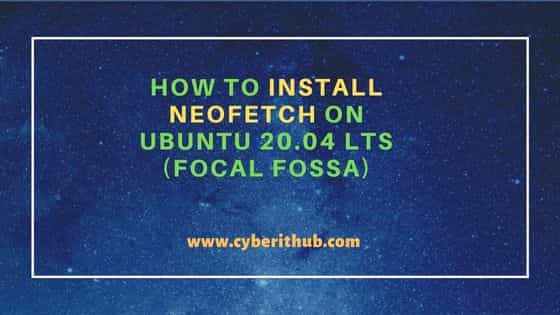Table of Contents
In this article, I will take you through the steps to install neofetch on Ubuntu 20.04 LTS (Focal Fossa). Neofetch is a free and open source command line tool written in bash 3.2+ to display information about your operating system, software and hardware in a user friendly manner. Neofetch allows you to configure and show the operating system information exactly the way you want. You can configure to use an image, a custom ASCII file, your wallpaper or nothing at all. Neofetch is supported in more than 150 operating systems from windows to linux. It is also very easy install in almost all the operating systems. Here we will see the steps to install Neofetch on Ubuntu 20.04 LTS Systems.

How to Install Neofetch on Ubuntu 20.04 LTS (Focal Fossa)
Also Read: How to Install Blockbench 3D Model Editor on Ubuntu/Debian
Step 1: Prerequisites
a) You should have a running Ubuntu 20.04 LTS Server.
b) You should have sudo or root access to run privileged commands.
c) You should have apt or apt-get utility available in your Server.
Step 2: Update Your Server
In the first step, you need to install all the available updates from default Ubuntu repo by using sudo apt update command and upgrade the packages to the latest version by using sudo apt upgrade command as shown below.
cyberithub@ubuntu:~$ sudo apt update && sudo apt upgrade
[sudo] password for cyberithub:
Hit:1 https://dl.google.com/linux/chrome/deb stable InRelease
Get:2 https://dl.winehq.org/wine-builds/ubuntu focal InRelease [8,041 B]
Get:3 http://security.ubuntu.com/ubuntu focal-security InRelease [114 kB]
Hit:4 http://ppa.launchpad.net/flatpak/stable/ubuntu focal InRelease
Hit:5 http://in.archive.ubuntu.com/ubuntu focal InRelease
Hit:6 https://download.sublimetext.com apt/stable/ InRelease
Get:7 http://in.archive.ubuntu.com/ubuntu focal-updates InRelease [114 kB]
Get:8 https://dl.winehq.org/wine-builds/ubuntu focal/main i386 Packages [392 kB]
Get:9 https://dl.winehq.org/wine-builds/ubuntu focal/main amd64 Packages [390 kB]
Get:10 http://in.archive.ubuntu.com/ubuntu focal-backports InRelease [108 kB]
Get:11 http://in.archive.ubuntu.com/ubuntu focal-updates/main amd64 Packages [2,424 kB]
Get:12 http://in.archive.ubuntu.com/ubuntu focal-updates/universe i386 Packages [717 kB]
Get:13 http://in.archive.ubuntu.com/ubuntu focal-updates/universe amd64 Packages [1,034 kB]
Fetched 5,301 kB in 7s (803 kB/s)
Reading package lists... Done
Building dependency tree
Reading state information... Done
12 packages can be upgraded. Run 'apt list --upgradable' to see them.
Reading package lists... Done
Building dependency tree
Reading state information... Done
Calculating upgrade... Done
...................................................
Step 3: Install Neofetch
In the next step, you can install neofetch from default Ubuntu repo by using sudo apt install neofetch command as shown below. This will download and install the package along with all its dependencies.
cyberithub@ubuntu:~$ sudo apt install neofetch Reading package lists... Done Building dependency tree Reading state information... Done The following additional packages will be installed: chafa gsfonts imagemagick-6-common libchafa0 libfftw3-double3 liblqr-1-0 libmagickcore-6.q16-6 libmagickwand-6.q16-6 Suggested packages: libfftw3-bin libfftw3-dev libmagickcore-6.q16-6-extra The following NEW packages will be installed: chafa gsfonts imagemagick-6-common libchafa0 libfftw3-double3 liblqr-1-0 libmagickcore-6.q16-6 libmagickwand-6.q16-6 neofetch 0 upgraded, 9 newly installed, 0 to remove and 12 not upgraded. Need to get 6,034 kB of archives. After this operation, 16.5 MB of additional disk space will be used. Do you want to continue? [Y/n] Y Get:1 http://in.archive.ubuntu.com/ubuntu focal/main amd64 libfftw3-double3 amd64 3.3.8-2ubuntu1 [728 kB] Get:2 http://in.archive.ubuntu.com/ubuntu focal/universe amd64 liblqr-1-0 amd64 0.4.2-2.1 [27.7 kB] Get:3 http://in.archive.ubuntu.com/ubuntu focal-updates/universe amd64 imagemagick-6-common all 8:6.9.10.23+dfsg-2.1ubuntu11.5 [61.0 kB] Get:4 http://in.archive.ubuntu.com/ubuntu focal-updates/universe amd64 libmagickcore-6.q16-6 amd64 8:6.9.10.23+dfsg-2.1ubuntu11.5 [1,646 kB] Get:5 http://in.archive.ubuntu.com/ubuntu focal-updates/universe amd64 libmagickwand-6.q16-6 amd64 8:6.9.10.23+dfsg-2.1ubuntu11.5 [302 kB] Get:6 http://in.archive.ubuntu.com/ubuntu focal/universe amd64 libchafa0 amd64 1.2.1-1 [42.1 kB] Get:7 http://in.archive.ubuntu.com/ubuntu focal/universe amd64 chafa amd64 1.2.1-1 [29.7 kB] Get:8 http://in.archive.ubuntu.com/ubuntu focal/universe amd64 gsfonts all 1:8.11+urwcyr1.0.7~pre44-4.4 [3,120 kB] Get:9 http://in.archive.ubuntu.com/ubuntu focal/universe amd64 neofetch all 7.0.0-1 [77.5 kB] Fetched 6,034 kB in 3s (1,762 kB/s) Selecting previously unselected package libfftw3-double3:amd64. (Reading database ... 200138 files and directories currently installed.) Preparing to unpack .../0-libfftw3-double3_3.3.8-2ubuntu1_amd64.deb ... ...........................................................
Step 4: Verify Installation
After successful installation, you can verify the installed files path by using dpkg -L neofetch command as shown below.
cyberithub@ubuntu:~$ dpkg -L neofetch
/.
/usr
/usr/bin
/usr/bin/neofetch
/usr/share
/usr/share/doc
/usr/share/doc/neofetch
/usr/share/doc/neofetch/changelog.Debian.gz
/usr/share/doc/neofetch/copyright
/usr/share/man
/usr/share/man/man1
/usr/share/man/man1/neofetch.1.gz
Step 5: Check Version
You can also check the current installed version by using neofetch --version command as shown below.
cyberithub@ubuntu:~$ neofetch --version Neofetch 7.0.0
Step 6: Launch Neofetch
To use neofetch tool, you just need to open your command line terminal and type neofetch to get all the system related information as you can see below.
cyberithub@ubuntu:~$ neofetch .-/+oossssoo+/-. cyberithub@ubuntu `:+ssssssssssssssssss+:` ----------------- -+ssssssssssssssssssyyssss+- OS: Ubuntu 20.04.5 LTS x86_64 .ossssssssssssssssssdMMMNysssso. Host: VirtualBox 1.2 /ssssssssssshdmmNNmmyNMMMMhssssss/ Kernel: 5.15.0-67-generic +ssssssssshmydMMMMMMMNddddyssssssss+ Uptime: 2 hours, 46 mins /sssssssshNMMMyhhyyyyhmNMMMNhssssssss/ Packages: 2076 (dpkg), 4 (flatpak), 14 (snap) .ssssssssdMMMNhsssssssssshNMMMdssssssss. Shell: bash 5.0.17 +sssshhhyNMMNyssssssssssssyNMMMysssssss+ Resolution: 800x600 ossyNMMMNyMMhsssssssssssssshmmmhssssssso Terminal: /dev/pts/0 ossyNMMMNyMMhsssssssssssssshmmmhssssssso CPU: Intel i5-1035G1 (1) @ 1.190GHz +sssshhhyNMMNyssssssssssssyNMMMysssssss+ GPU: 00:02.0 VMware SVGA II Adapter .ssssssssdMMMNhsssssssssshNMMMdssssssss. Memory: 461MiB / 1976MiB /sssssssshNMMMyhhyyyyhdNMMMNhssssssss/ +sssssssssdmydMMMMMMMMddddyssssssss+ /ssssssssssshdmNNNNmyNMMMMhssssss/ .ossssssssssssssssssdMMMNysssso. -+sssssssssssssssssyyyssss+- `:+ssssssssssssssssss+:` .-/+oossssoo+/-.
Step 7: Uninstall Neofetch
Once you are done using neofetch, you can choose to uninstall it from your system by using sudo apt remove neofetch command as shown below.
cyberithub@ubuntu:~$ sudo apt remove neofetch [sudo] password for cyberithub: Reading package lists... Done Building dependency tree Reading state information... Done The following packages were automatically installed and are no longer required: chafa gsfonts imagemagick-6-common libchafa0 libfftw3-double3 liblqr-1-0 libmagickcore-6.q16-6 libmagickwand-6.q16-6 Use 'sudo apt autoremove' to remove them. The following packages will be REMOVED: neofetch 0 upgraded, 0 newly installed, 1 to remove and 12 not upgraded. After this operation, 339 kB disk space will be freed. Do you want to continue? [Y/n] Y (Reading database ... 200567 files and directories currently installed.) Removing neofetch (7.0.0-1) ... Processing triggers for man-db (2.9.1-1) ...
